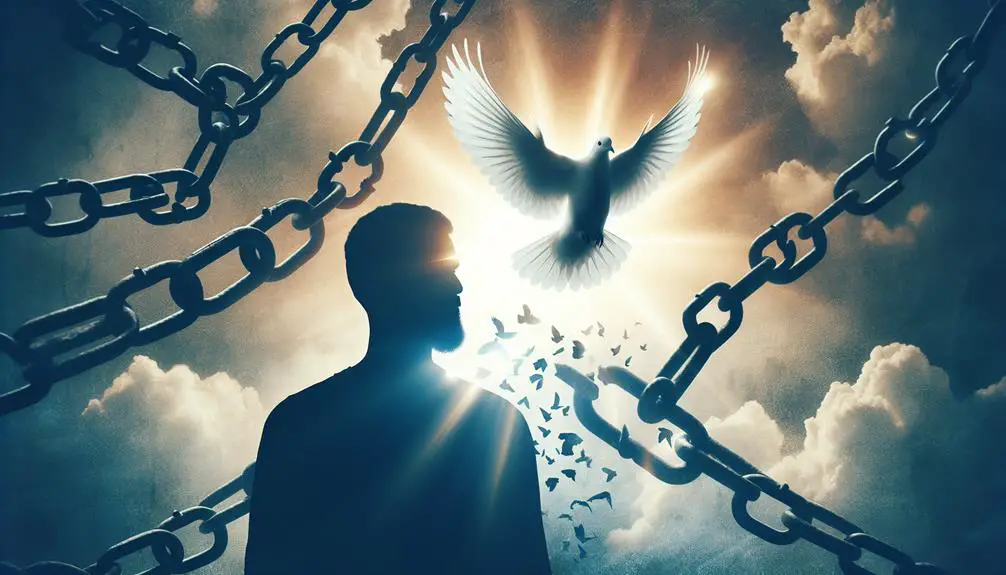Gain insights into the complex themes of bondage in the Bible, exploring how ancient narratives on slavery and sin shape our understanding of freedom.

Bondage in the Bible Meaning
Exploring the concept of bondage in the Bible is like peeling back layers of an ancient manuscript, each revealing deeper insights.
You'll find the narrative is not just about physical chains but also spiritual ones, intertwining tales of slavery with themes of sin and redemption.
From the historical accounts of the Israelites in Egypt to New Testament teachings on sin's bondage, these scriptures offer a complex view on liberation and salvation.
You're about to uncover how these ancient texts speak volumes on spiritual freedom, a topic that remains profoundly relevant today.
Let's embark on this journey together, where ancient words illuminate modern paths.
Key Takeaways
- Bondage in the Bible encompasses both physical slavery and spiritual enslavement, reflecting societal norms and theological dimensions.
- Spiritual bondage is rooted in sin and disconnection from divine guidance, emphasizing the need for divine intervention for redemption.
- Liberation and redemption are central themes, highlighting the importance of internal change and spiritual rebirth for overcoming bondage.
- The Bible advocates for empowerment, ethical living, and mental well-being as means to escape various forms of bondage.
Historical Context of Bondage

To understand the concept of bondage in the Bible, it's crucial to delve into its historical context, where societal norms and structures played a pivotal role in shaping its interpretation and application. You must recognize the profound influence of cultural practices and economic factors on the concept of bondage during biblical times. These elements weren't static; they evolved with the passage of time, influenced by migrations, conquests, and the emergence of new economic realities.
Cultural practices, deeply embedded in the societies of the ancient Near East, provided a framework within which bondage was understood and justified. These practices weren't merely traditions; they were mechanisms that maintained social order and hierarchy. In this context, bondage could be seen as a system that both reflected and reinforced societal values, including notions of property, honor, and social standing.
Economic factors played a crucial role as well. The economies of biblical societies were primarily agrarian, relying heavily on manual labor for cultivation and animal husbandry. In such an economic landscape, the labor provided by those in bondage was invaluable. It wasn't just about subjugation; it was a critical element of the economic infrastructure, essential for the production of food and maintenance of wealth.
Thus, when you explore bondage in the Bible, it's imperative to consider how cultural norms and economic necessities intertwined to shape the practice. This understanding illuminates the complexity of bondage, revealing it as a multifaceted institution that was integral to the fabric of ancient societies.
Physical Slavery in Scripture

Examining the scriptures reveals that physical slavery, as depicted in biblical texts, reflects complex socio-economic and theological dimensions inherent to the ancient world. The narrative around slavery isn't monolithic; it's woven with intricate threads of human experience, economic necessity, and divine interjections. You'll find that slave narratives within the Bible don't just recount tales of subjugation but also moments of profound revelation and unexpected mercy.
The economic implications of slavery in scripture are profound. It served as a backbone for many ancient economies, including those of the Israelites and their neighbors. The Bible doesn't shy away from describing the economic realities and dependencies formed through the institution of slavery. This acknowledgment provides a critical lens through which to view the social and economic structures of the time.
To add depth and complexity to this discussion, consider the following points:
- Slave narratives in the Bible often serve dual roles: They're historical accounts and theological teachings, providing insights into both the human condition and divine justice.
- Economic implications are twofold: Slavery bolstered ancient economies, yet the Bible also presents moments where economic norms are challenged or subverted for moral reasons.
- Theological dimensions: The scriptures use slavery as a metaphor for spiritual conditions, yet careful not to conflate this with the discussion on spiritual bondage, it's clear that physical slavery also served as a backdrop against which theological lessons were drawn.
Understanding physical slavery in scripture requires a nuanced approach, recognizing its historical, economic, and theological layers.
Spiritual Bondage and Sin

While the previous discussion illuminated the complexities of physical slavery in the Bible, it's imperative to explore how scripture articulates spiritual bondage, particularly its entanglement with sin. This form of bondage isn't shackled by the physical but is deeply rooted in the spiritual realm, where the soul is ensnared by sin, leading to a disconnection from the divine. The Bible elucidates this concept through narratives and teachings that underscore the consequences of sin, portraying it as a spiritual captivity that necessitates divine intervention for liberation.
Central to the biblical discourse on spiritual bondage is the notion of divine discipline. Scripture illustrates that God, in His sovereignty, utilizes spiritual bondage as a form of divine discipline, aimed at steering the wayward back onto the path of righteousness. This isn't punishment for punishment's sake but a corrective measure, designed to awaken the soul to its transgressions and prompt a journey towards repentance. The repentance journey, as depicted in the Bible, is both a personal and communal endeavor, where individuals and communities are called to turn away from sin, seek forgiveness, and realign with divine will.
In essence, spiritual bondage to sin isn't a permanent state but a transformative process, guided by divine discipline, that leads to spiritual awakening and renewal. The Bible's portrayal of this spiritual captivity underscores the gravity of sin while simultaneously offering a blueprint for redemption through repentance. This dynamic interplay between sin, divine discipline, and repentance journey underscores the Bible's profound understanding of the human condition and the pathway to spiritual liberation.
Liberation and Redemption

Frequently, the Bible presents the themes of liberation and redemption as pivotal to understanding the journey from spiritual bondage to divine restoration. You'll find that narratives of liberation often involve divine intervention, showcasing how God actively participates in the emancipation of His people. Redemption, on the other hand, delves into the transformative process where individuals or groups are delivered from a state of sin and spiritual enslavement to a state of grace and spiritual freedom.
In exploring these themes, the Bible navigates complex ethical dilemmas, posing questions about justice, mercy, and the nature of true freedom. For instance, the liberation of the Israelites from Egypt isn't only a physical emancipation but also an invitation to enter a covenant relationship with God, highlighting the ethical dimension of obeying divine laws as a condition for sustained freedom.
Key aspects to consider include:
- Divine Intervention: This encompasses the acts of God that directly influence the course of human history towards liberation and redemption. It's a testament to the belief that divine power can break the chains of bondage.
- Ethical Dilemmas: These are the moral conflicts encountered in the process of seeking liberation and redemption, often requiring profound discernment and faithfulness to God's commandments.
- Transformation: The shift from bondage to freedom isn't merely external but involves a deep, internal change of heart and mind, reflecting the spiritual rebirth that accompanies redemption.
Understanding these themes enriches your comprehension of the Bible's message about the human condition, offering insights into the spiritual journey towards liberation and redemption through divine grace and intervention.
Modern Interpretations

Building on the understanding of liberation and redemption, let's now explore how modern interpretations of these themes reflect contemporary societal values and challenges. You'll find that the narratives of bondage in the Bible have expanded beyond their ancient contexts to engage with current issues, revealing a profound cultural relevance. These interpretations often hinge on ethical considerations, challenging readers to reflect on issues of justice, freedom, and human dignity.
Theme |
Modern Interpretation |
Impact |
|---|---|---|
Liberation |
Freedom from societal and self-imposed constraints |
Inspires movements for social justice and personal empowerment |
Redemption |
Transformation through acceptance and forgiveness |
Encourages ethical living and compassionate actions |
Bondage |
Not just physical enslavement but also mental and emotional |
Raises awareness about mental health and emotional well-being |
Ethical Living |
Following principles that promote the welfare of all |
Advocates for ethical considerations in personal and public spheres |
In the light of modern challenges, the biblical narratives of bondage and liberation are interpreted through lenses that prioritize cultural relevance and ethical living. This approach doesn't just historicize these themes but also activates them in the present, urging a reconsideration of how we understand freedom and responsibility in our own lives. Such interpretations encourage an engagement with the text that is both respectful of its origins and innovative in its applications. They push for a dynamic interaction between ancient wisdom and contemporary ethical considerations, thereby ensuring that the discussion remains vibrant and relevant to today's societal challenges.
Frequently Asked Questions
How Do Contemporary Religious Scholars Reconcile the Ethical Dilemmas Surrounding the Biblical Endorsement of Slavery With Modern Values?
You're delving into how today's religious scholars tackle the moral conflicts between biblical slavery endorsements and contemporary ethics.
They often engage in ethical reinterpretation, viewing these passages through the lens of modern abolitionism and evolving moral standards.
This approach allows them to reconcile these ancient texts with today's values, arguing that the core biblical messages align more closely with principles of equality and justice than literal interpretations of historical practices might suggest.
In What Ways Do Different Christian Denominations Interpret the Concept of 'Bondage' Differently, and How Does This Affect Their Doctrine and Practice?
You're diving into how Christian groups view 'bondage' distinctively, impacting their beliefs and actions. Each denomination interprets spiritual freedom uniquely, shaping denominational practices.
This diversity means some prioritize liberation from sin as ultimate freedom, while others may focus on societal or emotional release. Analyzing these interpretations, you'll find a rich tapestry of beliefs influencing how each community lives out their faith, from worship styles to social justice efforts, reflecting their core understanding of 'bondage.'
Are There Any Notable Figures Within the Bible Who Challenged the Norms of Bondage and Slavery, and What Were Their Methods and Outcomes?
Imagine stepping back in time to witness firsthand the bold challenges against bondage. Moses, under divine command, led a mass exodus, freeing the Israelites from Egyptian slavery. His leadership, marked by faith and perseverance, redefined freedom for countless lives.
Similarly, Paul, through his epistles, subtly critiqued slavery, advocating for a spiritual emancipation that transcended physical bonds. Their actions and teachings significantly influenced the trajectory of human dignity and liberty.
How Has the Concept of Spiritual Bondage Been Used in Other Religious Texts Outside of the Bible, and What Are the Similarities and Differences in Interpretation?
You'll find that spiritual bondage, while deeply rooted in the Bible, also permeates other religious texts. Islamic teachings, for instance, emphasize redemption through submission to Allah, contrasting with Dharmic traditions which advocate for liberation through enlightenment and karma.
Analyzing these, the similarities lie in the pursuit of freedom from spiritual shackles, yet they diverge in paths to attain it—submission versus self-realization. Each tradition offers a unique lens on spiritual emancipation.
What Role Does the Concept of Bondage Play in Biblical Prophecies and Eschatology, and How Is It Understood in the Context of the End Times?
In biblical prophecies and eschatology, the concept of bondage plays a pivotal role, especially concerning the end times.
You'll find that spiritual liberation is often juxtaposed with apocalyptic imagery, illustrating a transition from a state of bondage to one of freedom.
This metaphorical use emphasizes the deliverance of the faithful from spiritual enslavement.
Scholars analyze these themes deeply, noting their significance in understanding the ultimate victory over sin and death in eschatological contexts.
Conclusion
In conclusion, isn't it profound how the Bible's narratives on bondage, both physical and spiritual, mirror our contemporary struggles for liberation and redemption?
Analyzing these ancient texts, you've journeyed through historical contexts, deciphered the deep implications of spiritual bondage, and contemplated the transformative power of redemption.
This exploration not only enriches your understanding but also challenges you to reflect on modern interpretations.
Indeed, the Bible's discourse on bondage remains ever relevant, urging us to seek freedom in all its forms.



Sign up